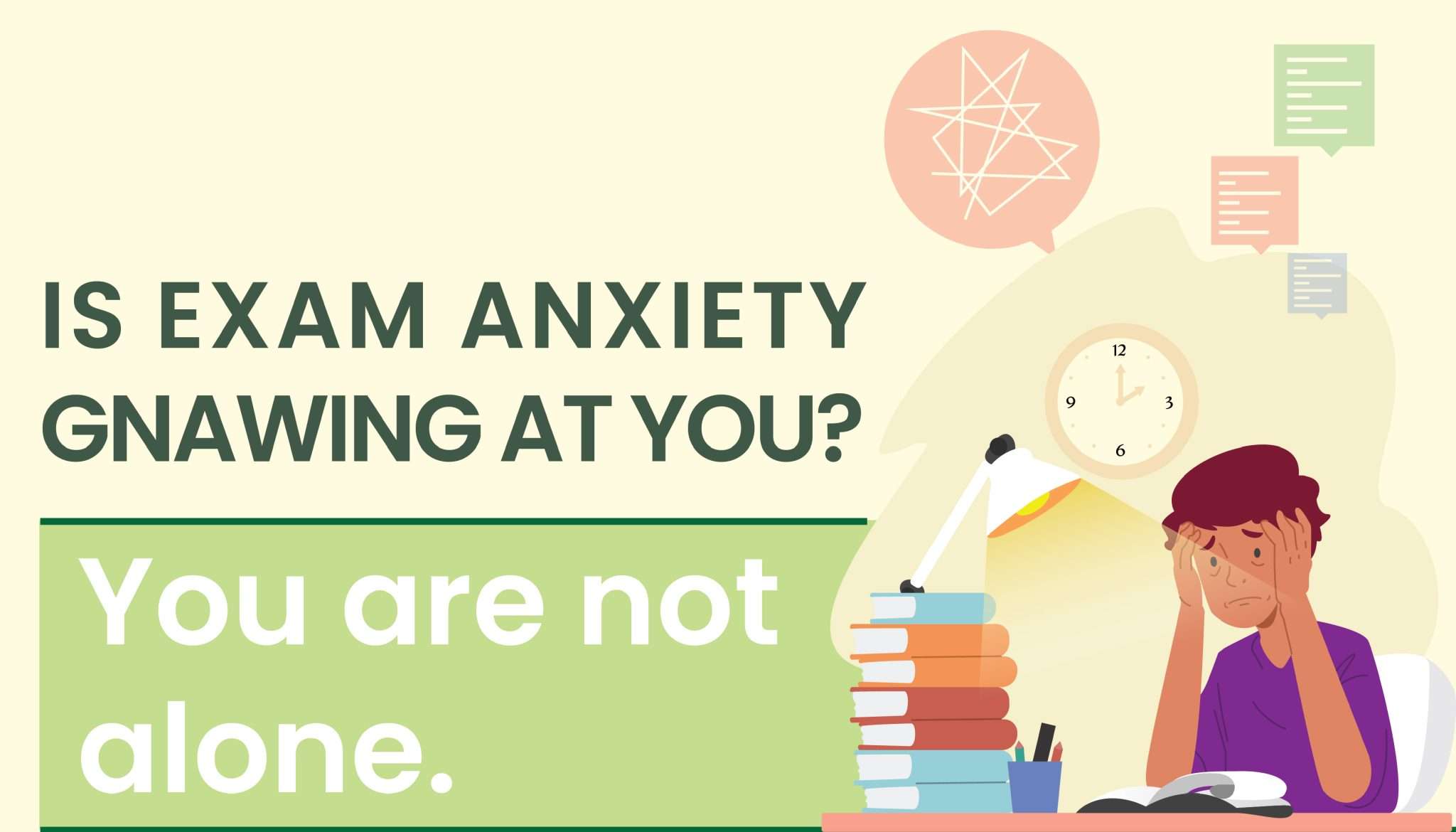BLOG
Is exam anxiety gnawing at you? You are not alone.


Anxiety, in amateur lingo, is feeling butterflies in the stomach, a sense of choking, nausea, and being disoriented. When people are socially awkward, they experience anxiety in a public place or a big gathering. Similarly, when one has poor self-esteem, they develop a fear of the exam or any monitored time-bound activity, like an exam.
Irrespective of the kind of test to be taken, ranging from driving tests to competitive exams, to regular college /school exams, every one of them causes an unusual fluster in the being. Very rarely do we see calm souls treading corridors of exam halls, with sheepish grins that can be, in fact, annoying. I remember my friends saying; I used to develop a wheeze before every chemistry test /exam. In retrospect, I realize it must have been anxiety. Due to a lack of awareness, pills and potions were administered, but the unaddressed anxiety grew up along with me.
Exam anxiety is a common occurrence, whether a studious one or a last-minute person. It is amazing that there are courses on handling test anxiety. It quite surprised me to stumble upon the Udemy course on “Tackling Test Anxiety”-A guided online course with a fee of 400INR. This only goes to prove how legit and relatable this issue is.
The bright side to this is, with empathy, support, and sustained practices in regulating emotions, we can bring them under control. A low anxiety level, experts say, is good as it nudges the individual to put in more effort, and prepare better. Only when it goes up and unsettles the individual does it become a cause for concern.
Post and pre-exam anxiety?
Pre-exam anxiety occurs when:
- A student has had a prior negative experience of not performing as expected or being reprimanded for bad scores.
- A student has been inconsistent in preparation and is trying to cram overnight.
- The pattern of the paper is unfamiliar and the student is clueless about what to expect.
- There is fear of ridicule or too much pressure to perform.
Post-exam anxiety shows up when:
- A student has not rested well and goes blank in the exam hall.
- The difficult questions demotivate and the student is unable to proceed with the exam.
- A student does not complete or overlook questions and thus is prone to lose chunks of marks.
- Lack of practice to plan the time for each section of the question paper.
How to recognize it?
In any household, the exam fever will be very palpable as you enter the doors. Parents may appear more stressed in certain situations. Irrespective of the age spectrum, an exam-going individual reflects characteristics that are typical and universal.
Some common symptoms of stress are:
- Headache
- Muscle tightness
- Overeating/loss of appetite
- Irritable and isolated
- Pacing up and down /restless
- Nausea/Vomiting
How to regulate it?
- Establish a routine for study hours.
- Take frequent breaks while studying.
- Reward yourself for every planned portion completed.
- Watch a favorite TV show, or go for a stroll in the sun.
- Only caution is to be sensitive to resuming work after break hours.
- Eat a nutritious diet, and drink plenty of fluids.
- Avoid binging on junk, and altering sleep patterns, due to last-minute preparation.
- Keep the phone on Digital well-being mode –work time settings.
- It challenges your temptation to scroll on the gadget.
- Practice simple relaxation techniques, like pranayama and meditation.
- A few stretches-check out – the ‘GrowwithJo’-workout series. They are fun and quick.
Suggestions for the day of the exam.
- Wake up on time, so the morning is not rushed or causes angst.
- Don’t miss breakfast and keep a fruit handy, for last-minute hunger pangs.
- Keep all exam-related material, like hall ticket/admit card, stationery, and a bottle of water ready the previous night.
- Do not study anything new on the day of the exam.
- Only do a recap if needed.
- Take a stroll and avoid the student crowd that is discussing multiple questions.
- This will leave you confused and flummoxed.
- Leave home early, to arrive before the hustle begins.
- This will give time to ease off stress and cool the nerves.

Depending on the individual’s ability to confront challenges, anxiety levels may vary. Both parents and teachers have an equal role to play in contributing to a child’s state of mind. When the child knows that it has a supportive environment, where there is only encouragement and no ridicule, then the pressure becomes lighter. The college ought to prepare students well with revisions and endearing words of empowerment. With the right practices inculcated early, an individual develops adequate coping mechanisms even during stressful times.
New Horizon gurukul rises up to meet this parameter, where teachers are well equipped to not just teach and repeat, but walk the students through mock tests and practice sessions. They also recognize students with increased anxiety symptoms, and with the help of the college counselor, offer suggestions to the family of the child, to incorporate into their everyday lifestyle. Since the college uses practical exposure to explain theoretical knowledge, students organically retain content in their memory and are able to approach exams without fear.
Start small and keep calm. It is only an exam. A high or a low grade does not define your future or your personality. Go and give your best and forget about it.
This guide on managing exam anxiety offers practical techniques for students under stress. When supported by yoga in schools and life skill training, it nurtures resilience. Institutions like New Horizon Gurukul, a leader among top cbse schools in bangalore, truly support students’ mental well-being. It’s also one of the most trusted gurukul schools in bangalore.

